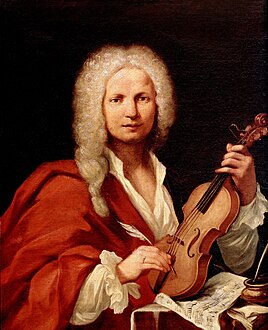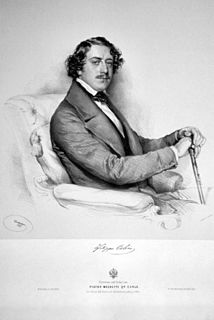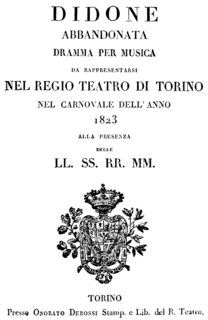The year 1669 in music involved some significant events.

Alessandro Severo is an opera by George Frideric Handel composed in 1738. It is one of Handel's three pasticcio works, made up of the music and arias of his previous operas Giustino, Berenice and Arminio. Only the overture and recitatives were new. The impresario Johann Jacob Heidegger probably selected the 1717 libretto by Apostolo Zeno, originally written for Antonio Lotti and re-used by many composers thereafter.

Alessandro nelle Indie is an opera seria in two acts by Giovanni Pacini to a libretto by Andrea Leone Tottola and Giovanni Schmidt, based on Alessandro nell'Indie by Pietro Metastasio. It was premiered at the Teatro di San Carlo in Naples on 29 September 1824, and had a total of 38 performances in its first season.
Il Mitridate Eupatore is an opera seria in five acts by the Italian composer Alessandro Scarlatti with a libretto by Girolamo Frigimelica Roberti. It was first performed, with the composer conducting, at the Teatro San Giovanni Grisostomo, Venice, on 5 January 1707. A failure at its premiere, Mitridate Eupatore is now considered one of the finest of Scarlatti's operas.
Il trionfo dell'onore is an operatic 'commedia' in three acts by the Italian composer Alessandro Scarlatti, with a libretto by Francesco Antonio Tullio. It was first performed at the Teatro dei Fiorentini, Naples, on 26 November 1718. It is Scarlatti's only known comic opera.
Filippo Acciaiuoli was an Italian composer, librettist, theater manager, machine designer, and poet. Acciaiuoli spent much of his youth and early adulthood traveling throughout Europe, the Middle East and Northern Africa. After returning to Rome in his early twenties, he initially studied mathematics at a seminary in Rome but ultimately became interested in theater. He is best known for his work as a librettist for operas such as Jacopo Melani's Girello, which premiered in Rome in 1668, and as the inventor of numerous sophisticated machines that were used in theatrical productions of the day. He also composed one opera, Chi è cagion del suo mal pianga se stesso, which premiered in Rome in 1682.

Scanderbeg is an opera in three acts composed by Antonio Vivaldi to an Italian libretto by Antonio Salvi. It was first performed at the Teatro della Pergola in Florence on 22 June 1718 to mark the re-opening of the theatre to public performances. While the libretto has been preserved, only fragments of the original score remain.

Filippo Colini was an Italian operatic baritone. Debuted with the Accademia Filarmonica Romana in 1831. He is best known today for creating roles in the world premieres of several operas by Giuseppe Verdi, including Giacomo in Giovanna d'Arco (1845), Rolando in La battaglia di Legnano (1849), and Stankar in Stiffelio (1850).
Calliroe is a melodramma eroico or opera in 2 acts and 23 scenes by composer Giuseppe Farinelli. The work uses an Italian language libretto by Gaetano Rossi. The work premiered at La Fenice in Venice on 3 January 1808 in a double bill with the house premiere of Urbano Garzia's ballet Il calunniatore punito ossia Il conte Lenosse.
Alessandro Melani was an Italian composer and the brother of composer Jacopo Melani, and castrato singer Atto Melani. Along with Bernardo Pasquini and Alessandro Scarlatti, he was one of the leading composers active in Rome during the 17th century. He is also ranked among the second school of Roman opera composers which began with his brother's 1668 opera Il Girello. He is chiefly remembered today for his large output of liturgical music that he wrote while serving in various musical posts in Rome. Of particular interest is the large number of polychoral motets that he produced and his eight ascribed oratorios. Three published collections of his liturgical music survive today along with numerous solitary motets from other published volumes. A number of original manuscripts also survive.
I riti d'Efeso is a dramma eroico per musica or opera in 2 acts and 26 scenes by composer Giuseppe Farinelli. The work uses an Italian language libretto by Gaetano Rossi. The work premiered at La Fenice in Venice on 26 December 1803 in a double bill with Filippo Beretti's Atamaro e Obeide.

Medea is an opera in three acts composed by Giovanni Pacini to a libretto by Benedetto Castiglia. It premiered on 28 November 1843 at the Teatro Carolino in Palermo, conducted by the composer with Geltrude Bortolotti in the title role. The libretto is based on the plays Medea by Euripides and Médée by Pierre Corneille.

Issé is an operatic pastorale héroïque by the French composer André Cardinal Destouches. Initially it was in three acts. The definitive revised version consists of a prologue and five acts. The libretto was by Antoine Houdar de la Motte. Although Destouches was only 25 at the time of its premiere, it is considered his best score.

Il Pompeo is a dramma per musica in three acts by composer Alessandro Scarlatti. Written in 1682 when Scarlatti was 22 years old, it was his fourth opera and first dramatic work on a serious and grand subject. The opera uses an Italian language libretto by Nicolò Minato which had previously been used by Francesco Cavalli for his 1666 opera Pompeo Magno. The work premiered at the Teatro di Palazzo Colonna in Rome on 25 January 1683.

L'honestà negli amori is a dramma per musica in 3 acts by composer Alessandro Scarlatti. Written in 1679-1680 when Scarlatti was 19 years old, it was his second opera. The opera uses an Italian language libretto that was written by either D F Bernini or Domenico Filippo Contini. The work premiered at the Teatro di Palazzo Bernini in Rome on 3 February 1680. The opera was performed again in 1682 in Acquaviva delle Fonti at the Palazzo De Mari with Acquaviva laureata a serenata composed by Giovanni Cesare Netti.
Nitocri is an opera in two acts composed by Saverio Mercadante to libretto by Apostolo Zeno adapted by Lodovico Piossasco Feys. The libretto is a fictionalised account of the Egyptian queen Nitocris. The opera premiered at the Teatro Regio in Turin on 26 December 1824.
Giovanni Filippo Apolloni was an Italian poet and librettist. Born in Arezzo, he has sometimes been referred to as "Giovanni Apollonio Apolloni", but the second given name is spurious. He served as the court poet to Ferdinand Charles, Archduke of Austria at Innsbruck form 1653 until 1659. On his return to Italy he entered the service of Cardinal Volumnio Bandinelli. After Bandinelli's death in 1667 Appolloni was in the service of the Chigi family in Rome and Siena for the rest of his life. He wrote the librettos for a number of operas, the most well-known of which were Antonio Cesti's L'Argia and La Dori, as well as several oratorios and the texts for cantatas by both Cesti and Alessandro Stradella.
Napoli milionaria is an opera in three acts composed by Nino Rota to an Italian libretto by Eduardo De Filippo based on his 1945 play of the same name that was also made into the 1950 play Side Street Story. Conducted by Bruno Bartoletti, the opera premiered at the Teatro Caio Melisso in Spoleto on 22 June 1977 as part of the Festival dei Due Mondi.

Didone abbandonata is an 1823 opera in two acts by Saverio Mercadante to a libretto by Andrea Leone Tottola after Metastasio's Didone abbandonata. It was first performed on 18 January 1823 at the Teatro Regio in Turin.







